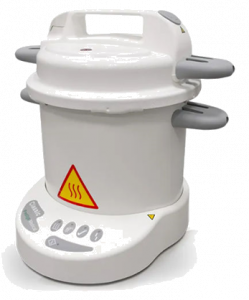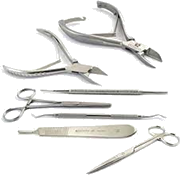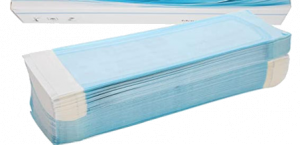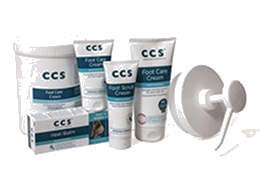Foot Health Practitioner

Love your Feet
Get your feet checked by your Foot Health Practitioner even if you have healthy feet. This can help prevent foot, toe, and nail problems. You can also learn what to look out for and what shoes and insoles are best for your feet.
A Foot Health Practitioner can help diagnose your foot problem and find the best treatment plan for you. They are foot specialists who have spent time training to help keep your feet healthy.
£40.00 to include the treatment of…
Initial assessment taking into account medical history, past and current conditions.
Nails cut & Filed, Corns, Callus, Cracked Heels, Ingrowing Toe Nails, Fungal & Thickened Nails, Athlete’s Foot, Verrucas.
£25
A general foot health check.
A basic nail cut and file with foot cream massage.
The instruments are all sterilised in an autoclave then sealed in sterile pouches so there is no risk of cross contamination or infection.



CS Foot Care Cream contains urea to help lock in moisture and improve the barrier function of your skin. Each tube is also infused with eucalyptus oil to help soften the skin while also eliminating odour, leaving you with fresh, revitalised, healthy feet.

Treatments
£30.00
Routine foot health treatment for existing patients.
The information on foot problems has been obtained from the NHS website.
Athletes Foot is a contagious fungal infection of the skin that appears on the feet. It is often found between the toes, however it can affect the entire foot. The symptoms of Athletes Foot are red, moist and itchy skin; blisters may also develop.
Many anti-fungal creams, powders and sprays are available over the counter and your chemist can provide details on those in stock. Creams and sprays should be used on the skin to treat Athletes Foot and must be applied as per instructions. This usually means continuing treatment for 2-3 weeks, even if the rash has completely disappeared.
In order to prevent further contamination anti-fungal powder should be used in shoes and socks.
Chilblains are found in people with poor circulation to their extremities. In cold/damp weather the small blood vessels shut down completely and patches on the toes (most commonly) turn dusky red, purple or even blackish. They usually start off itchy, but as they deteriorate they can split open and ulcerate and become painful. Prevention is the best cure! Keep warm, wear warm socks, thermal insoles and slippers, eat well and don’t smoke. Never heat the feet up suddenly (for example by toasting them on the radiator or in front of the fire) and use a chilblain cream in cold weather before the problem starts.
Dry and cracked heels are generally caused by lack of moisture in the skin which can be worse when wearing open backed shoes such as sandals.
Cream your feet daily after a bath or shower with a thick moisturising hand or foot cream.
Consider wearing socks or stockings or closed in shoes even in hot weather if you find the dry skin is worse or the skin cracks.
Continue to apply the cream daily when the skin is better to prevent recurrence.
Fungal nail infections are common. They’re not serious but they can take a long time to treat.
Fungal nail infections develop when your feet are constantly warm and damp. You’re more likely to get an infection if you wear trainers for a long time and have hot, sweaty feet.
The nail becomes brittle and pieces can break off. Sometimes the whole nail lifts off. This can cause pain and swelling in the skin around the nail.
I have had personal experience of this condition caused by the trauma of breaking my ankle, which has taken two years to heal.
- Treat athlete’s foot as soon as possible to avoid it spreading to nails
- Keep your feet clean and dry
- Wear clean socks every day
- Wear flip-flops in showers at the gym or pool
- Throw out old shoes
I cover an area approximately 15 miles of Whitstone.
An appointment for a foot health practitioner visit can be booked at the following:
- Private Home
- Residential Home
- Nursing Home Care Home
- Sheltered Accommodation

